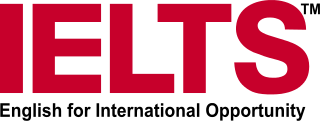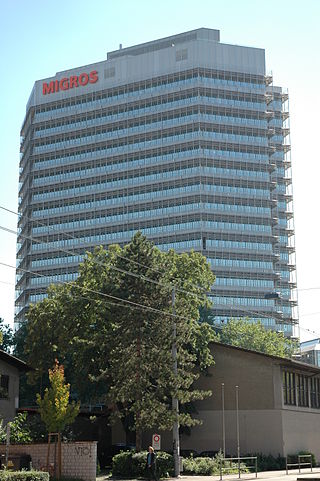Language education – the process and practice of teaching a second or foreign language – is primarily a branch of applied linguistics, but can be an interdisciplinary field. There are four main learning categories for language education: communicative competencies, proficiencies, cross-cultural experiences, and multiple literacies.

International English Language Testing System is an international standardized test of English language proficiency for non-native English language speakers. It is jointly managed by the British Council, IDP and Cambridge English, and was established in 1989. IELTS is one of the major English-language tests in the world. The IELTS test has two modules: Academic and General Training. IELTS One Skill Retake was introduced for computer-delivered tests in 2023, which allows a test taker to retake any one section of the test.

English as a second or foreign language refers to the use of English by individuals whose native language is different, commonly among students learning to speak and write English. Variably known as English as a foreign language (EFL), English as a second language (ESL), English for speakers of other languages (ESOL), English as an additional language (EAL), or English as a new language (ENL), these terms denote the study of English in environments where it is not the dominant language. Programs such as ESL are designed as academic courses to instruct non-native speakers in English proficiency, encompassing both learning in English-speaking nations and abroad.

CELTA is an initial teacher training qualification for teaching English as a second or foreign language (ESL and EFL). It is provided by Cambridge Assessment English through authorised Cambridge English Teaching Qualification centres and can be taken either full-time or part-time. CELTA was developed to be suitable both for those interested in Teaching English as a Foreign Language (TEFL) and for Teaching English to the Speakers of Other Languages (TESOL). The full name of the course was originally the Certificate in English Language Teaching to Adults and is still referred to in this way by some course providers. However, in 2011 the qualification title was amended on the Ofqual register to the Cambridge English Level 5 Certificate In Teaching English to Speakers of Other Languages (CELTA) in order to reflect the wider range of students that teachers might have, including younger learners.
A foreign language is a language that is not an official language of, nor typically spoken in, a specific country. Native speakers from that country usually need to acquire it through conscious learning, such as through language lessons at school, self-teaching, or attending language courses. A foreign language might be learned as a second language; however, there is a distinction between the two terms. A second language refers to a language that plays a significant role in the region where the speaker lives, whether for communication, education, business, or governance. Consequently, a second language is not necessarily a foreign language.

Migros is Switzerland's largest retail company, its largest supermarket chain and largest employer. It is also one of the forty largest retailers in the world. It is structured in the form of a cooperative federation, with more than two million members.
The Common European Framework of Reference for Languages: Learning, Teaching, Assessment, abbreviated in English as CEFR, CEF, or CEFRL, is a guideline used to describe achievements of learners of foreign languages across Europe and, increasingly, in other countries. The CEFR is also intended to make it easier for educational institutions and employers to evaluate the language qualifications of candidates for education admission or employment. Its main aim is to provide a method of learning, teaching, and assessing that applies to all languages in Europe.
Cambridge Assessment English or Cambridge English develops and produces Cambridge English Qualifications and the International English Language Testing System (IELTS). The organisation contributed to the development of the Common European Framework of Reference for Languages (CEFR), the standard used around the world to benchmark language skills, and its qualifications and tests are aligned with CEFR levels.
A language school is a school where one studies a foreign language. Classes at a language school are usually geared towards, for example, communicative competence in a foreign language. Language learning in such schools typically supplements formal education or existing knowledge of a foreign language.
Migros Ticaret A.Ş. is one of the biggest chains of supermarkets in Turkey.[citation needed]
Language proficiency is the ability of an individual to use language with a level of accuracy which transfers meaning in production and comprehension.
Trinity College London ESOL is an international English Language examinations board delivering assessments in English language learning and teaching and has been offering English language examinations since 1938. Trinity College London's exams are taken by over 850,000 candidates in over 60 countries each year.
British Study Centres (BSC) is a group of English language schools consisting of eight adult language schools and seventeen junior centres, including the City Football Language School in partnership with Manchester City, with the majority of schools and centres based in the UK. The head office is located in Brighton & Hove, East Sussex. Today, British Study Centres (BSC) specialises in English language training for adults and young learners, teacher training courses for UK and overseas teachers and University Pathway programmes in partnership with NCUK.
Kaplan International is a division of education company Kaplan Inc., a wholly owned subsidiary of Graham Holdings Company, formerly known as The Washington Post Company. Kaplan International is headquartered in London and consists of a number of global education businesses including Kaplan International Pathways and Kaplan International Languages. Kaplan International Pathways has partnerships with over 40 universities worldwide and prepares 20,000 international students for university each year. Kaplan International Languages provides English courses, as well as French and German courses after acquiring Alpadia Language Schools in 2019, and it offers a wide range of courses at locations in the UK, Ireland, USA, Canada, Australia, New Zealand, France, Germany, Switzerland and Spain. As a result of government-imposed travel restrictions arising from the COVID-19 pandemic, Kaplan International's revenue fell 13% in 2020 to US$654 million, although still accounted for half of Kaplan Inc.’s total revenue in that year.

The Valencian International University (VIU) is a private university in Spain with an international remit. It was founded by the regional government of Valencia in 2008. 70% of it was later acquired by the Planeta publishing house. The university is officially recognized by the Spanish Ministry of Education. It is headquartered in Valencia, Spain.
Eurospeak Language School is an institution that specializes in English language training and cultural exchange. The school was founded in 1991 and is in Reading, United Kingdom. The founder of Eurospeak, Michael O'Brien, died in 2011. Eurospeak also has a "subsidiary" in Almaty, Kazakhstan. Each year, Eurospeak welcomes more than 1,349 students from over 71 nationalities. In May 2018, Eurospeak submitted a planning application to create new premises at Cumberland Place, Southampton. The planning application was approved, and Eurospeak Southampton opened in October 2018.

Adele Duttweiler was a Swiss philanthropist and the wife of Gottlieb Duttweiler, founder of both the Migros group and the LdU political party.
Klubschule is a group of adult education programs initiated by Adele and Gottlieb Duttweiler. The literally club school is a brand of the Swiss Migros group which provides courses and programmes at about 50 locations throughout Switzerland.

The Institute of Continuing & TESOL Education (ICTE) is a university located in Brisbane, Australia specialising in English language courses, teacher training, professional development, and English language testing.

Migros Magazine is a weekly free newspaper of the Swiss retail group Migros. Previously, the magazine Wir Brückenbauer, founded by Migros founder Gottlieb Duttweiler in 1942 and published by the Federation of Migros Cooperatives, was subtitled "Wochenblatt des Sozialkapital".







